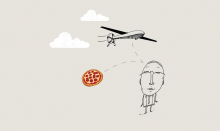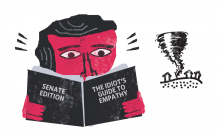H'rumphs

I’VE BEEN SPENDING a lot of time with my credit card company lately. Nice people work there, of course, and I try to make every phone call a time of conviviality and respect. It’s what good people do.
Credit card guy: Sir, my name is Brian, and ...
Me: No, it’s not.
“Brian”: I beg your pardon?
Me: Be honest. They give you anglicized names to sound more American, right? So when did you get that name?
“Brian”: When I was born. It’s also my father’s name.
Me: And, you’re calling from, like, Mumbai or ...
Brian: Texas.
Me: [awkward moment of silent self-loathing, mercifully cut short by seeing a butterfly. Pretty.]
But you readers understand my point. American jobs should be for Americans. Honest, God-fearing Americans who embody the spirit of freedom and entrepreneurship. Like the guy in Kansas who, according to Brian, had just purchased an iPad with my credit card number. Brian was calling from Texas to make sure this was okay with me, which it wasn’t.
Don’t get me wrong. I’m all for buying an iPad or any of the high-tech gadgets that I’ve had my eye on. And I totally get that the guy in Kansas feels the same way. In fact, I was cool with him right up to the point where he decided to keep it for himself.

FOR MORE THAN two centuries, the United States has been the proudest example of democracy in the world. Maybe not the best, but definitely the proudest. Oh sure, we’ve hit some rough patches over the decades, mainly in dealing with our native peoples and other ethnic minorities. Also with women, the poor, the falsely accused, the unemployed, and people who aren’t bankers. But let’s just call those growing pains.
For the most part, America has been that shining city on a hill, and by America, of course, I don’t mean Canada or Mexico, or the other countries whose names I forget, most of which don’t have many good hills to shine from anyway.
But I’m not talking about geography, I’m talking about pride. The pride that comes from being number one in democracy, despite being number 55th in infant mortality and 35th in math. Okay, so we don’t test well. But we’re proud anyway. And we’re still number one in Bible science! [High five!]
But lately, because of continued dysfunction on Capitol Hill, people are starting to whisper that democracy in the United States may have lost some of its shine, like we’re “hiding it under a bushel,” as it says in the old Christian campfire song of my youth. (We also sang “With Jesus in My Boat I Can Ride Out the Current Economic Downturn,” and “Children, Go Where I Text Thee.”)
But if America’s “little light” is no longer shining, at least a few other nations are providing good examples of self-government.

RESEARCHERS from Tel Aviv University recently announced a discovery that could shake the foundations of biblically based history currently taught in most states below the Mason-Dixon line (otherwise known as “Jesus Country,” unless Jesus comes back without a photo ID).
Granted, biblical controversies may not be the most important thing to you right now, when you’re coming up with this year’s excuse why your new beach body won’t be ready by Memorial Day. But we should never shirk from scholarship that could deepen our faith or, short of that, allow us to use the phrase “camel bones” for the first time in our lives.
To wit: Using carbon-dating techniques to determine the age of the world’s oldest-known camel bones, researchers have determined that camels could not have been the pack animals referred to in much of the Old Testament. At that time, camels had not yet been introduced to the region. It’s not clear if camel introductions were something that just wasn’t done in polite company or if the dearth of camels was only alleviated by Egyptian merchants establishing Mediterranean trade routes. But the latter would be my guess and is, in fact, the conclusion of the Tel Aviv researchers.
And it’s good we see eye-to-eye with the scientists on this particular issue, since their method is one I hold in contempt. I took it personally when carbon dating was used to disprove that the Shroud of Turin displayed the real image of Jesus Christ. I believed in the Shroud. When preachers would sermonize on faith the size of a mustard seed, I would smile condescendingly, because my faith was bolstered by something big enough to cover a good-sized twin bed! And with a picture of Jesus on it! (Much cooler than Justin Bieber or a Disney princess.)
I’ve never believed much in carbon dating since then. Speed dating, maybe. But not the other thing.

SINCE THE 2014 election could be the most decisive political moment in a generation, the most important question is: Who will be Hillary's running mate in 2016?
The second big question is: What else does Chris Christie have to do to make other Republican presidential hopefuls slip back into the woodwork? What part of “you want a piece of me?” don’t they understand? Have they no fear of—just to choose something at random—major traffic delays in their districts? Are they currently enjoying their drinking water or other public utilities? Do they like their kneecaps?
A bit harsh, perhaps, especially regarding a man whose political obituary is already being written, and whose Wikipedia entry may one day not start with “45th president of the United States,” but with the phrase “Angry Birds spokesperson.”
But Chris Christie is a survivor. He may be only six Twinkies away from not being governor of New Jersey (assuming that he eats them all in one sitting), but he enjoys a strong approval rating and, at this writing, is still innocent of all accusations against him, including humility. His only real threats for the nomination are Paul Ryan and Jeb Bush, who is currently trying to be adopted by a family with a different last name.
The influence scandal that has roiled Christie’s staff and highlighted his strong negatives happened, after all, in New Jersey. And what happens in New Jersey stays in New Jersey because, for their own protection, witnesses tend to fugetaboutit.

THIS YEAR IS shaping up to be one of enormous transition, although nothing specific comes to mind right now. I’ve just got this gut feeling. But the word that will best guide us through the coming changes may be “adaptation,” which my copy of the Merriam-Webster Dictionary defines as “the process of changing to fit some purpose or situation.” My copy of the dictionary also wants me to know how grateful it is to be picked up from behind the bookshelf where it had fallen years ago. It wedged against a hot-water pipe and got kind of u-shaped.
It actually felt good to look up something in hard copy, even if the pages were warm and wrinkled. But using Google is much faster, even subtracting the time it takes to first sing the alphabet song to remind me what order the letters are in. The point is, dramatic changes will be happening to our world, and we either adapt to them or die.
Okay, maybe not die. But when Brand New becomes No Turning Back, there’s no point in resisting. This year, for better or worse, “I don’t wanna” will become “but I hadda.”
My family has already started making the necessary changes. We have no fireplace in our home, since our house was built before the discovery of fire, and thus we have no chimney for Santa to come down. But last Christmas we adapted. We hung the stockings from the microwave, then left the door open and hoped for the best.

AS A TEST subject in an ongoing medical study, I can report with confidence that, so far, I’m still alive—an important variable in research that measures the effect of Vitamin D and fish oil on heart health. At least, that’s the stated purpose. But, after taking the pills every day for two years of the five-year study, I’m thinking there may be something else going on.
It’s called a “vital study,” and it’s being run by the Harvard Medical School, a prestigious institution that typically leaves your average research projects to lesser entities, such as the federal government. But this is a “vital study,” and if Harvard is involved it must be big, probably top secret. And it chose me for a reason (other than my awesome averageness, of course).
But why? I admit I’m an older white male, the main population for the study, but since our contact has been exclusively by email, how did Harvard know? Were they tipped off by my habit of Googling subjects like calcium retention, wrinkle removal, and the name of the woman on Gilligan’s Island who wasn’t the movie star. (Editor’s Note: Mary Ann.) Doh!
Perhaps Harvard used email as a clever ploy to mask the fact that they’ve been closely monitoring me for years, observing my selfless nature and noble commitment to the greater good, except when I’m driving. To Harvard, I must have seemed the ideal subject for a secret project to build a lean, mean, elderly fighting machine!

THIS IS OUR first issue of the new year, and with the new year comes new challenges, new hopes, and new promises which, in order of appearance, you may not live up to, will probably fail to realize, and may never keep. Fortunately, this January issue comes out in early December, several weeks before most self-delusions begin to surface, so there’s still time to change them all, thus saving face. And here in Washington, D.C., saving face is very important. Living up to challenges, not so much. But saving face? We understand.
So let’s get started with turning your future failures into successes and your future frowns into smiles, which are just frowns turned upside down, depending on whether you’re standing on your head at the time.
The point is, you don’t have to make the same mistakes again this year, because we can stop your resolutions before you make them. We can nip failure in the bud, because failure is just eruliaf turned upside down. Or possibly backward. Regardless, following is a short list of things you may have pledged to do this year. Think again.
Lose weight. Right. Sure. Whatever. Not going to happen. So stand up straight and hold your stomach in until your friends walk by. Then breathe. And remember: You’re not too fat. You’re just too short.

DESPITE THE heart-felt and hand-written requests from thousands of American children in their Christmas letters, Santa has just announced he cannot bring them a new Congress this year. He tried, Santa wants us all to know; he tried hard. But he and his elves finally gave up when even the parts imported from China couldn’t make the thing work.
They first attempted to construct something with U.S.-made components, but it was almost as if the parts didn’t want to work together, like they had minds of their own. This surprised the elves since Congress—which has no apparent moving parts—hasn’t had a sentient thought in years.
However, as a small concession to all those disappointed little children, Santa this year will be honoring Christmas wishes that have traditionally been difficult to fulfill.
If Sally from Shreveport can’t get a workable electoral body in the nation’s capital, then she gets a pony. Simple as that. She asked for it last year—in fact she’s been asking for a long time—but this year she’ll get it. If her parents are not sure what to do with a 600-pound animal that requires constant attention and care, then maybe next time they’ll think twice before voting for a member of Congress who wears a three-cornered hat and proudly refuses to be treaded on, even though nobody’s trying.

WITH THE HEAT of mid-year finally over—judging by the fact that Dallas has settled into a sweater-friendly 97 degrees—it’s time to look back and see what we’ve learned from another summer filled with unpredictable weather extremes.
For example, a couple weeks in August were actually extremely comfortable, which was no help to my crusade to convince Fox-loving friends that the earth is warming. Lately, even scientists have been of little use, adamantly refusing to blame rampant forest fires and extreme droughts on climate change. They insist on “analyzing” patterns of weather “over time” to honor “standards of science.” There’s nothing worse than climatologists dragging their feet when there are righteous accusations to be flung. Global warming is behind EVERYTHING wrong! You know it. I know it.
Okay, sorry.
But this summer had way too many examples of the extreme consequences of climate change, including deadly tornadoes, inundating floods, and town hall meetings that brought forth a storm of discontent. Unsuspecting members of Congress had left the comforting gridlock of Washington, D.C., and, failing to first check for a full moon, had innocently invited questions from constituents in their home districts. This is almost always a mistake. You really need to test the water before you just walk into a home district unprepared.

SINCE WE NOW know the federal government has been monitoring our every move for years—recording our telephone calls, reading our emails, trying to friend us on Facebook (“you have 295,984,457 mutual friends!”)—I wanted to clarify a few personal remarks that may have been misconstrued by NSA computers; computers which, I might add, are doing a heckuva job.
When I emailed a friend that I thought I “killed” at a recent gathering, I meant that I was particularly amusing that evening. I was not bragging about some heinous crime, which I would never commit anyway because, frankly, that’s not where the laughs are.
But “killed” looks bad in cyberspace, even though it’s something comedians want to do, as opposed to “bombed,” which is the opposite of “killed,” although NSA computers probably recognize a certain similarity between the two and automatically alert law enforcement officials. But again, the word “bombed” is a comedy concept meaning, variously, “wishing you were dead as an audience sits silently in judgment,” or for me, who entertains mainly in the homes of friends, “wishing you were dead, because people are laughing about you in the kitchen.”
But living in a free society means we shouldn’t have to watch what we say to avoid the unwanted curiosity of federal authorities. Heck, I get into enough trouble just trying to cheer up taciturn gatherings. (“Hey, is this a party or a funeral, hah hah?! What? Oh, sorry, I didn’t notice the flowers. Yes, he’ll be missed.”) On second thought, maybe a few days of secret CIA interrogation might do me some good. (“Were you under instructions from al Qaeda when you embarrassed your host by juggling the dinner rolls? Are there other social events you plan to terrorize or disrupt in the near future?”)

NOTHING MOVES ME more than a heartfelt tweet. Seriously. Don’t think I’m making fun here. I understand that the Twitter universe (“Twitterverse”? “World o’ Twits”?) is the current preferred method for connecting with the most people in the shortest amount of time. It’s certainly preferable to my generation’s method of communicating, which was to spray-paint the sides of barns.
But if the inspirational tweet is from a member of Congress—taking time away from doing the nation’s business in the most powerful city in the world, depending on where the Koch brothers are living at the time—I can get really choked up.
“My thoughts and prayers are with those in Oklahoma affected by the tragic tornado outbreak.”
Oozing with empathy and originality, this tweet was sent out by Oklahoma Sen. Tom Coburn a few hours after the extreme weather event in May that ravaged the town of Moore. What the tweet did not include—and his office quickly added, lest survivors searching through the rubble for loved ones got the wrong impression—was that the senator would not support federal relief funding unless it was offset elsewhere. If it’s not in the budget, according to Coburn’s long-standing philosophy, it’s not happening.
But let’s be fair: With a tweet you only get 140 characters, so in addition to the words “thoughts” and “prayers,” there’s barely enough room left over to express the important concepts of “freedom,” “liberty,” and “bootstraps,” three concepts people just love to think about when they’re crawling from under what used to be their house. Coburn’s point seems to be that when you’re covered with sheetrock, torn family photographs, and spray-painted sides of barns, the last thing you want is some government bureaucrat arriving with a meddlesome helping hand.

WITH SO MANY of our sacred institutions collapsing from within, it was a relief to hear that all charges have been dropped against an Elvis impersonator from Mississippi, thus sparing his worthy avocation from disrepute. Paul Kevin Curtis had been accused of sending poisoned letters to officials in Washington, D.C., but FBI officials soon came to their senses and realized that anyone who spends time impersonating a celebrity who’s definitely left the building probably couldn’t make a salad dressing with vinegar and oil, much less extract lethal chemicals from exotic plants.
Ricin was the poison in question, and seems to be the current compound of choice for disgruntled letter terrorists. Before that it was anthrax, an easy-to-produce material which, as it turns out, is what happens when you make salad dressing and get the ingredients wrong. A little too much balsamic, a couple nosy neighbors, and pretty soon the FBI wants to chat.
Fortunately, this man was absolved of all wrongdoing, guilty of nothing except the single act that sets him apart as a hallowed foundation of our society, the one institution that has consistently contributed to Americans’ self-esteem. Because as long as there are Elvis impersonators around, the rest of us will always feel happy and fulfilled. All of our important life decisions—some made in haste, others made in desperation, and each one now regretted—seem steadfast and well-considered, because they have kept us from going down the path of a celebrity impersonator.

JUNE IS A special month, particularly for families celebrating ... uhm ... something. I forget. Fortunately, ever since I read a study suggesting that cholesterol-lowering statins can cause problems with ... with ... word retrieval, I realize now it has nothing to do with getting old, which many people my age are getting these days. It’s because I’m just another victim of an unscrupulous drug industry. (Drug company lawyer: “I understand that you think you took our drug, sir, but how can you be sure?”)
But now I remember why June is special: Our oldest daughter is getting married this month, and I can use our cover story as a reminder that I’m probably supposed to do something to help out. Although darned if I can remember what it is.
My daughter’s won’t be a gay marriage, which is trending this year, but it will be an alternative wedding, one of those nontraditional celebrations that doesn’t require me to dress up and “give away” the bride. (If I was going to give her away, I should have done it well before the wedding bills started coming in.) There’ll be no church to rent and no preacher to pay. The ceremony will be outside, probably in a tent, and we already have one of those. (It sleeps four. Nice size for an intimate gathering, if people don’t mind stooping during the service.)
The problem is that she wants to invite a lot of friends and family, an inclination that has always puzzled me about marriage ceremonies. A wedding is a sacred ritual between two people, an intimate, spiritual moment of connection that shouldn’t be ruined by a bunch of other people sticking their noses in. Why have a ceremony at all? Why not just get married, say, in the back of a van, on the way to the honeymoon? Or just go to the DMV or whatever government office has the forms that the clerk could ceremoniously—and no doubt with tears in her eyes—slide across the counter to be signed. I could quietly sing a romantic tune in the background to set the tone, and to block out the loudspeaker announcing the next available window. And then they’d be done. Heck, you don’t even have to get a blood test any more, although since they’re marrying in Virginia, they may need to prove they own a handgun. If they can’t, one will be provided for them.

MICROSOFT WORD is one of those computer programs that mimics the power of the human brain: It has enormous capabilities—specifically for document preparation—but we use only a tiny percentage of it, mainly to make signs for our yard sale next weekend. Naturally, we do this during office hours, since heaven knows the weekend will be busy enough.
Likewise, our brains can handle numerous complex tasks, such as learning multiple languages—a capacity I would never use, since I'm currently inside my home hiding out from the sequester—although for some reason the only thing it lets me remember from high school is that you should never talk to a football player's prom date, because you can get the snot beat out of you.
Similarly, Microsoft Word can do things you never asked for.
Recently a colleague was typing something religious for our next issue when Word suddenly offered to translate it into French, and then back into English again. Always open to distractions when typing religiously, my colleague clicked, "Well, sure, why not?" (Control/Shift/F2/blink) and the result revealed why it's often difficult to find common ground with people from other countries: They talk funny.
In some languages, for example, sounds we assume are caused by the speaker dislodging a hairball from his (or her) throat are actually words meant to communicate important messages about, say, a nation's willingness to go to war if not left alone, which the U.N. translator totally misses because he (or she) is thinking about that hairball.

THE DAY BEFORE President Obama's second inauguration (campaign code name: "Neener, neener, neener!"), Republican Sen. Mitch McConnell sent an email to constituents with a message somewhat lacking in a spirit of new beginnings: "The gun-grabbers in the Senate are about to launch an all-out assault on the Second Amendment. They're coming for your guns."
This is disturbing. I don't have any guns, but I'm looking for places to hide them. And without guns, how will I protect my family from the coming assault? Can I hold off federal agents by flinging small appliances at them? Those I've got. In fact, I just got a new hand mixer. It's black and sleek, like the helicopters that will soon be circling over our homes. (Helicopter tip: Make sure the rotor blades have completely stopped before licking off the icing.)
Under Obama's new proposals, I'll probably have to register my appliances, or at least submit to a background check before I buy another one. Although I've heard you can avoid that if you get them at private appliance shows.
This latest attention to gun control prompted National Rifle Association leader Wayne LaPierre to take the stage and, looking directly into the eyes of the American people, vehemently deny that he is French. Additionally, he helpfully pointed out that "the only thing that stops a bad guy with a gun is a good guy with a gun." Or was it the other way around? To be honest I'm not sure what he said, because I got distracted by the wild look in his eyes, and the bits of saliva that gather in the corners of his mouth whenever he talks about guns. This guy really likes guns.
What I would ask Mr. "LaPierre" [giggle]—while keeping both hands out where he could see them—is this: How do you stop a good guy with a gun who's having a bad day? Or what if he's really depressed or angry at his boss for not allowing him to wear camouflage clothing to staff meetings?

AS WE MOVE along in 2013, more initiatives will be coming on line from Obamacare (technically the Patient Protection and Affordable Care Act, although if you rearrange the letters it spells "death panels"). Starting next year, insurance companies can no longer deny coverage for anyone with pre-existing conditions, which is good news for Mitch McConnell, who might want to have his permanent frown removed. Additionally, the law requires that all tea party members take a spoonful of castor oil before bedtime and wear coarse undergarments close to the skin. (Hey, it was a big bill, with lots of fine print.)
What won't change, however, is our relationship to the pharmaceutical industry, known as "Big Pharma"—which is not, as you may have thought, the nickname of a linebacker from one of our agricultural-state colleges, but rather shorthand for "companies that combine ground-breaking science with the business model of a crack dealer." No offense to crack dealers.
I recently had a personal experience with Big Pharma, after two weeks with a projectile cough that filled the middle distance with an alluring prismatic mist. Office colleagues did not appreciate my little air rainbows, so I contacted my doctor for advice, using the convenience of email rather than driving over and changing into a disposable paper gown which—and I feel strongly about this—does not adequately flatter the body of a mature man.
I described my symptoms with a level of detail that only a professional writer can do, using the lushness of the English language to create a memorable narrative of my condition and symptoms. Naturally, I expected my doctor to reply in kind. But she didn't: "You're sick. Here's a prescription." (Science geek.)

SO HOW WAS your fall off the fiscal cliff? Did you drop straight to the bottom or bounce several times off jagged rocks on the way down, land in a bramble bush, and then stare back up at that annoying roadrunner? Ouch. (And why didn't the roadrunner jump off the cliff? Did he have a more reasonable approach to spending and taxation? Is he naturally more conciliatory with his opponents? Nah. He's just smarter about sudden dropoffs.)
I'm just asking because, as I write this, we're still heading toward that cliff, so I won't know if we drove off it, braked just short of it, or maybe stopped to ask directions from an old guy sitting by the side of the road in a tattered beach chair. "Yup, you keep going straight for a couple miles, then look for the coyote tracks."
There is no question that our nation is facing major fiscal imbalances—although, to be fair, our low wages are more than offset by high cholesterol. But hopefully the president—Barack "Whew!ssein" Obama—will have avoided the impending crisis by reaching a compromise with Republican leaders, although at press time it seemed he was drawing a clear line in the sand. Of course, that's easy to change because, you know, it's just sand.
But I've never cared for the cliff analogy. I think of a cliff as something you throw things off, like a stick you found, or a rock, or a Fox News pundit who is now talking positively about immigration reform. (Don't forget to make a wish before you make the toss.)

I DON'T WANT to keep harping about this climate change thing, but someone has to have the singular courage to stand up for the future of our globe. Someone, I mean, besides 98 percent of the world's climate scientists, the governments of every other industrialized nation, and millions of people around the world. Not counting those, I am that man.
Because I have seen the future of a warming planet, and it's not just fraught with melting glaciers and rising oceans. It's also got stink bugs.
Twice a year, Sojourners' editors and its highly esteemed art director drive to a cabin in the mountains of West Virginia to plan future issues. (I will pause briefly for Colorado readers to stop laughing convulsively at the suggestion that hilltops a few hundred feet above sea level can be called "mountains." But if I get carsick on the drive up, I'm calling it a mountain.)
After we arrived this fall—and my stomach finally calmed down—we settled into our usual method of magazine planning: a rapid-fire brainstorming of ideas both provocative and ground-breaking, but not so much that it keeps me awake. Then came the first telltale tapping sounds from the window.
A half-dozen stink bugs had gathered on the inside of the pane, with a dozen more on the outside, all of them repeatedly bumping into the window, unable to decide on one plan of action. But enough about Mitt Romney.

BELATED CONGRATULATIONS to Jesus Christ after recent research revealed that he might have been married during his short life. (Although, if he had to help with the dishes every night, it might have seemed longer.)
My immediate reaction was to wonder what you get a deity for a wedding present, even though it’s way too late. Their Pottery Barn listing is probably out of date, but that might be for the best, since all the cheap stuff would have been taken by now. (My oldest daughter is getting married next year, so I speak from experience that you’ve got to get in there fast and sign up for that salt shaker. Otherwise, you’re stuck buying an entire set of towels, or a food processor. She’s my daughter, but one must draw the line.)
Trying to get your head around the idea that the shortest verse in the Bible should be “Jesus wed,” the whole thing seems a little farfetched, but you can’t argue with possible science. Harvard Divinity School professor Karen L. King claims that a 4th-century papyrus fragment, written in the Coptic language of Egyptian Christians at the time, makes a reference to Jesus’ “wife.” King presented her findings at a recent gathering of the International Congress of Coptic Studies, which doesn’t seem like the kind of gathering that generates much Twitter traffic, unless there’s a private party in one of the rooms. (“Would you like to come upstairs and see my papyrus fragments?”)
From what I can tell by the photos, the handwriting on the fragment looks like a shopping list I’d hurriedly written out and then couldn’t read when I got to the store. Not having the foresight to bring along a Coptic translator, I’d invariably forget that one thing the family really needs. I wonder if Jesus had to put up with the same condescending looks when he brought home the wrong stuff. Okay, probably not.
THE SKIES LOOK different to me these days. The soft and tranquil clouds of my youth that often reminded me of cute Disney characters—a misty Dumbo drifting languidly overhead—have mostly been replaced by dark and threatening formations, more reminiscent of Disney’s lesser-known films, such as Godzilla vs. The Little Mermaid: This Time It’s Personal. More specific, the violently roiling skies of late are like a scene from Steven Spielberg’s War of the Worlds, where intense storm clouds heralded an alien invasion.
Which is why I always carry a prepared speech of surrender in my backpack, in case I need to immediately declare loyalty to a superior race. Although, so far, the alien presence has been pretty unimpressive, consisting mainly of crude, humanoid Kardashians attempting to assimilate quietly. One hopes that when the next prototypes arrive, they will better conceal the vaguely reptilian features of their planet’s indigenous life forms. Not to mention vice presidential hopeful “Paul Ryan,” whose hairline displays the telltale widow’s peak once thought to be a unique facial characteristic of earthly vampires, until NASA rovers spotted it on a rock on Mars. (Mars reportedly privatized its health care for seniors decades ago, and just look at the place now: not an elderly person in sight.)
BUT WHAT WAS I talking about? Oh yes, the weather. The typical forecast this summer included phrases such as “hurricane-force winds,” “damaging hail,” and “start hoarding toilet paper.” Of the four mature trees in our yard, only one remains, having survived repeated gale-force winds through pluck and attitude, although having a trunk the circumference of a grain silo probably helped. (I could never get my arms around it for a hug, back when I used to do that sort of thing.)